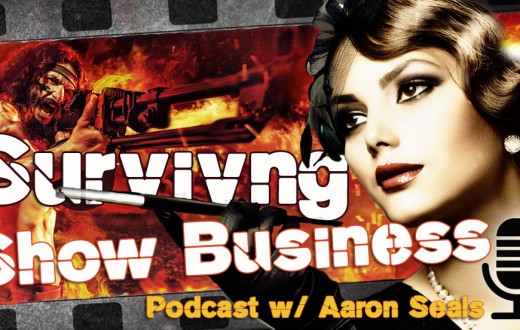Actors, Don’t let anyone fool you: the actor’s life is a gloriously enjoyable one. We get to collaborate with creative, energetic, passionate people of all stripes every day. (Did I mention beautiful, charming and funny also?) We get to play dress-up as part of our jobs. We get to visit endless worlds and eras. And we get to use our imaginations to put ourselves in the shoes of the people living there.
Hell, the verb “to play” is a core part of our job description!
There’s work involved, of course, hard work. But while we work very hard to develop our skills, at the end of the day. the work is actually a joy, or it should be. But having said that, let’s face the facts: it also takes a lot of work behind the scenes to truly get an acting career of the ground. Who wouldn’t love to have a talented agent in their corner, helping to track down great roles for you?
And while getting an agent or manager is one of the big challenges facing up-and-coming talent, an often overlooked venue for starting a conversation about representation is the good old talent showcase. Going into these ritual events, many actors find themselves flummoxed and flustered in a way that playing a normal role in a stage or screen production wouldn’t leave them. They find themselves completely at sea without a set script or a director calling all the shots: how can I best present myself at a talent showcase so that an agent or manager might be interested in representing me?
Side Note: People often ask is there a difference in an agent vs. a manager? For the purposes of a showcase and showing off your talent, they are pretty equal, and often do similar jobs in terms of representing you to for work in the early stages of your career. They both submit you to casting directors for auditions in the early stages, but a manager has evolving roles in an actors career as it progresses. They often take a more hands-on role in you career, by ‘shopping you’ to various agencies, ensuring you’re represented in each area of business that you have talent in. In more advanced careers, they may oversee things like: Lawyers, Publicity & Travel and the agents will remain the main source for submitting you for work. Agents and managers work together to cover all the facets of a performers career. You can read more on the differences here. You can read more about managers here. Listen to a podcast on agents & managers.
Here are a few tips gleaned from conversations with agents and managers.
1. Play the role you were born to play – literally
As actors we spend a lot of time playing other people. That’s kind of the gig: playing a role has been described as putting on a jacket that is that character. You wear that jacket for the audition or the shoot or the production, and then after production wraps you put that jacket away in the closet. You don’t toss it out; you may wear it again, or have it tailored slightly differently for some future role. But the jacket – the essential truth of that character – is something you always have stored away somewhere close by where you can get to it.
But what was the very first jacket you ever put on? The original one, of course: You. The character of yourself, your personality and what makes you tick. The thing about talent showcases is that it’s not so much about killing it in some epic role in your allotted time slot, but rather about letting those in attendance see the essential truth of YOU shine through whatever type of performance you choose to do. Rather than struggling to put on some shiny new jacket, to really knock it out of the park and deliver an earth-shattering, bone-crushing performance, most talent agents will tell you what they’d rather see is who is the essential person behind the mask. Think about it: the particular role or piece you’re performing at a talent showcase doesn’t mean anything to a prospective agent. He or she isn’t thinking, “Wow, this mash-up of Hamlet and death metal is killer! I’ve got to get this kid signed!” No. They’re thinking about you and what other types of roles they could conceivably put you up for. So, just like we always say when we talk about auditions, finding a piece that lets the real you shine through is your ticket. Hit it out of the park, sure, but make sure you’re swinging at a pitch that’s in your wheelhouse, something you’re well-suited to play and which fits your natural energy and style, and you’ll have a much better chance of scoring a meeting with a talent agent.
2. Show them you’re creative
Obviously, many actors fret and fuss and stress when they learn of an upcoming showcase they’re going to be in. It’s a big moment, presenting your skills and talents for a room full (hopefully) of industry movers and shakers who could potentially give your career a boost. But let’s remember that acting is largely a psychological game we actors must play on ourselves, not to put too fine a point on it.
As Sanford Meisner said, “Acting is behaving truthfully under imaginary circumstances.” Now, we all know, and surely most of us live by this quote. But if you step back for a minute and consider it anew, this is completely nuts. Acting thus requires a degree of psychological freedom to play, and that’s the spirit you should tap into when it’s time to prepare something for a showcase. Instead of worrying about what random, faceless agents and industry pros might or might not like, give yourself permission to think outside the box a little. While you’ll likely have an instructor or director involved in the talent showcase production, at the end of the day, you are the driving creative force behind your little segment of the show. You have the final say-so in what you do and how you do it. Have fun! Come up with something that works for you and your general type, but don’t be afraid to think creatively. I promise you, most agents have had their fill of seeing the same old pieces from “True West,” “Lobby Hero” and “Proof” at talent showcases. Choosing the material because it’s safe and well-known can mark you as, if not creatively stunted, at least someone who fears to make the bold, imaginative choice. I read the other day that Jim Parsons did a scene from Alan Ball’s “Your Mother’s Butt” for his industry showcase, while Josh Radnor (“How I Met Your Mother”) did something from an obscure Steve Martin-penned Shakespeare parody titled “Romeo and Juliet at Antioch.” Find something that isn’t so tired that the entire talent showcase audience immediately pull out their phones right when you begin because they too have the sides memorized just from having seen it so many times. That way you’ll show them you are a creative, imaginative thinker as well as an actor – in other words, someone who would be a great team member to collaborate with on any production.
3. Be prepared
A common misconception many younger actors roll with is that once they get an agent, they don’t have to do any more work on the promotion side of their career anymore. They’re going to sign with an agency, drop off a stack of headshots, and then go home and wait for the offers to come rolling in.
No. No, no, no. Nothing could be further from the truth. They say the Lord helps those who help themselves, and the same could be said of agents. They love to see a potential client who already has developed a healthy network of industry contacts, who has his or her social media game on point, and who understands how to work a room. So when you go to your talent showcase you’re going to need to prepare more than your scene. Make sure you’ve got up-to-date professional headshots at the ready, updated resumes with all current information, and that the link to your reel (right here on NYCastings!) is live and that you have clips of your latest and best material in there. There’s no bigger killer of an agent’s interest than when they encounter an actor who isn’t ready for prime-time in terms of presenting him or herself off-camera. Think about it: if you were to sign with this agent, while it’s true they represent you, the fact is when they send you out in the world to read for roles, you are representing them in a way too. If the actors an agency sends out are the type who are typically unprepared and unprofessional, that agency may well find themselves receiving fewer and fewer phone calls.
When you go to your talent showcase, bring all the physical materials you need like headshots and resumes and have links at the ready to share, but also prepare yourself to play the role of self-promoter. Be ready to engage with people and talk intelligently about upcoming projects, personal projects, who you are, your interests, what drives you, and your creative outlets apart from acting. You’re selling yourself, not just the role you’re playing at the talent showcase!
Keep in mind that NYCastings is also a great way to sell yourself to industry professionals, with hundreds of audition notices every day and thousands of eyeballs looking for talent right here on these very pages. Sign up today!







